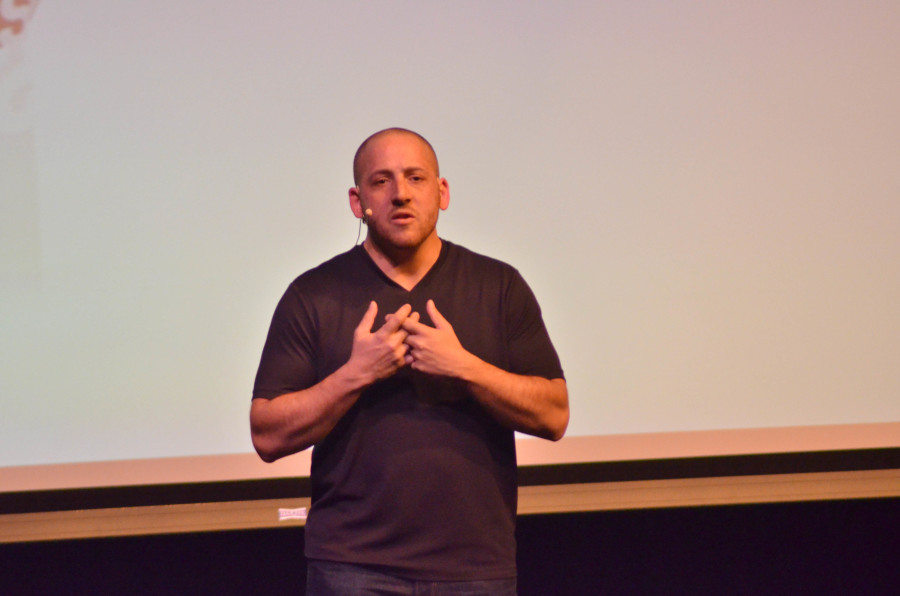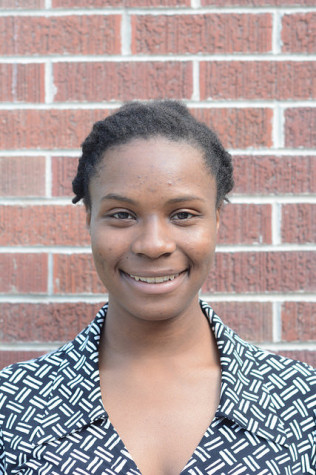Suicide prevention advocate shares his experience
January 21, 2015
Kevin Hines, who survived a leap from the Golden Gate bridge, came to Showalter Auditorium on the evening of Jan. 13 to talk about his life since that suicide attempt and share his message of mental health and healing.
Approximately 250 students gathered at 7 p.m. to listen to the author, mental wellness and suicide prevention advocate, share his experience.
Hines was born to parents who both suffered from bipolar disorder and used recreational drugs, even during pregnancies. He and his brother “bounced around seedy motels … the kind with concrete slab floors” during his infancy, until one day a motel manager called the police.
“Frankly, it was the best day of our lives.”
Hines and his brother were removed from his parents custody, and his brother died shortly after. Hines, however, was eventually adopted by Debra Joan and Patrick Kevin Hines, the man whose name he now carries.
Hines took medication for an epileptic disorder until he was 17-and-a-half years old, when he was taken off the medication because his seizures were under control. What his doctors and family did not know was that this seizure medication had the secondary effect of treating depressive disorders. Once it left his system, Hines said he suffered “a complete mental breakdown.”
He became manic, believed people were plotting to kill him, heard angry voices and saw things no one else could see.
“And … what goes up must come down,” said Hines, describing the deep depression that followed. Hines became suicidal, but he said it was not a “desire” to die that drove him. “I never wanted to die. I desperately wanted to live while my brain was trying to kill me … being compelled to do something because of brain malfunction does not mean it’s a choice.”
On Sept. 24, 2000, Hines wrote a suicide note. The next day he dropped the majority of his college classes. He had given away prized possessions and was “tying up loose ends,” all things Hines said were signs he was thinking about suicide.
Finally, he traveled to the Golden Gate Bridge. On the bus, Hines said he was seized by ambivalence about what up to that point he had firmly believed he must do, he pledged to himself that if anyone asked him, “Are you okay?” “Is something wrong?” or “Can I help you?” that he would tell them everything. No one did.
Sobbing, he threw himself off the bridge. “It was an instant regret … and I couldn’t take it back,” said Hines. “I prayed, ‘God, please save me, I don’t wanna die. I made a mistake.’”
Hines fell 220 feet at 75 mph. He threw his head back to avoid dying instantly. His lower vertebrae shattered “like glass,” damaging internal organs.
Two improbable factors converged to contribute to Hines’ survival: The best friend of his high school band teacher happened to drive by as he jumped from the bridge. She immediately called a personal friend on the coast guard on her cell phone. After Hines hit the water, shooting down 70 to 80 feet, he was buoyed up by a sea lion who swam in circles beneath him, keeping him afloat until the Coast Guard arrived.
Hines was diagnosed with bipolar disorder and over a decade later he released a memoir titled “Cracked … Not Broken: Surviving and Thriving After a Suicide Attempt.”
Hines’ talk was sponsored by Housing and Residential Life, Eagle Entertainment and Health, Wellness and Prevention Services.
Tricia Hughes, wellness director at Health, Wellness and Prevention Services, said her office co-sponsored the event because they believed Hines could positively affect mental health discourse on campus.
“We thought it was important to bring [Hines] in … because mental health issues are sometimes not spoken about. We wanted him to come in and have that conversation, that dialogue,” said Hughes. “We’re are trying to destigmatize mental health issues around campus.”
Destigmatization may be especially necessary in college since, according to Hughes, mental illness is not uncommon at EWU.
“The data that we collect every two years shows that we have high levels of health concerns … issues like stress, anxiety, depression … so we want to make sure that we bring in education that helps with theses things.”
Hughes was referring to the National College Health Assessment, a voluntary survey conducted by the American College Health Association.
The survey, which maintains the confidentiality of students’ answers, asks questions about everything from alcohol and drug use, to sexual health, to daily stress and physical activity.
EWU has participated every other spring quarter since 2006 and successfully garnered statistics from 833 students in 2014.
Hughes further emphasized the relevance of Hines’ story.
“[Hines] has a story we think is relatable. He was diagnosed at 19 and the college age is the time when a lot of mental health diagnoses are made.”
Hines said he still suffers from bipolar disorders. He still hears voices, sees things others cannot and suffers from paranoia and delusions.
“But what I also have is self awareness,” said Hines, noting that an intimate knowledge of his own mental health has enabled him to get the help he needs when his mental health is starting to deteriorate.
Hines offered hope to students who suffer from mental illness.
“Remember that you can live mentally well with a mental illness most days,” said Hines. “But it is a fight, tooth and nail.”
Info box:
CAPS (Counseling and Psychological Services)
225 Martin Hall
CAPS offers group individual counseling sessions, crisis intervention, trauma recovery education and other resources to students and faculty. Walk-ins are welcome Monday through Friday from 1-4 p.m., or call (509)359-2366 to make an appointment.
In case of emergencies after hours or on weekends, call Spokane Mental Health at 509-838-4651 or First Call For Help at 509-838-4428.









